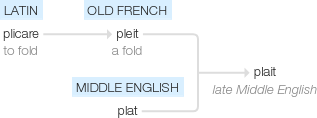Plait
late Middle English: from Old French pleit ‘a fold’, based on Latin plicare ‘to fold’. The word was formerly often pronounced like ‘plate’; since late Middle English there has been an alternative spelling plat, to which the current pronunciation corresponds.
wiktionary
From Middle English pleit, from Anglo-Norman pleit (compare Old French ploit), from Latin plectō, which is akin to Old Norse flétta (Danish flette) and to Russian сплетать(spletatʹ). Doublet of plight(“plait, fold”).
etymonline
plait (v.)
late 14c., pleiten, "to fold (something), gather in pleats, double in narrow strips," also "to braid or weave (something)," from plait (n.) and also from Old French pleir "to fold," variant of ploier, ployer "to fold, bend," from Latin plicare "to fold" (from PIE root *plek- "to plait"). Related: Plaited; plaiting.
plait (n.)
late 14c., pleit, "a fold, a crease, a flattened gather made by doubling cloth or similar fabric in narrow strips upon itself," also "interlaced strands of hair," from Anglo-French pleit, Old French ploit, earlier pleit, "fold, manner of folding," from Latin plicatus, past participle of plicare "to lay, fold, twist" (from PIE root *plek- "to plait").
